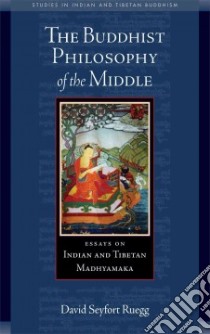- Libreria
- >
- Libri in lingua
- >
- Religione e spiritualità
- >
- Religione e fede
The Buddhist Philosophy of the Middle - 9780861715909
Un libro in lingua di Ruegg David Seyfort edito da Wisdom Pubns, 2010
- € 35.70
- Il prezzo è variabile in funzione del cambio della valuta d’origine
Madhyamaka, the "philosophy of the middle," systematized the Buddha's fundamental teaching on no-self with its profound non-essentialist reading of reality. Founded in India by Nagarjuna in about the second century C.F., Madhyamaka philosophy went on to become the dominant strain of Buddhist thought in Tibet and exerted a profound influence on all the cultures of East Asia. Within the extensive Western scholarship inspired by this school of thought, David Seyfort Ruegg's work is unparalleled in its incisiveness, diligence, and scope.
"Since the nineteenth century, Indo-Tibetan Madhyamaka philosophy has held a special fascination for many in the West---for those who work in the fields of Buddhist studies and comparative philosophy as well as for Buddhist practitioners. Madhyamaka analysis probes essential issues in the philosophy of language, the philosophy of mind (how we think about the world), ontology (how we think the world is constituted), and epistemology (how we know the world). D. Seyfort Ruegg's multiple incursions into this subtle mode of thinking have been path-breaking and, I dare say, of unique importance to anyone investigating Madhyamaka ideas."---Leonard Van Der Kuijp, Harvard University
"In a scholarly career spanning more than fifty years, David Seyfort Ruegg has produced seminal studies on a remarkable range of figures, texts, and issues in Indian and Tibetan thought. His essays on Madhyamaka---many of them classics in the field---are gathered together here for the first time, reminding us of Professor Ruegg's enduring contributions to the field of Buddhist studies."---Donald S. Lopez, University of Michigan
"Throughout his scholarly life, Professor David Seyfort Ruegg has returned time and again to the Madhyamaka tradition of Buddhism, an apex in the intellectual culture of India and Tibet. The meticulous and lucid analysis in his pioneering studies has contributed substantially to the progress of our understanding of Madhyamaka---its history, philology, literature, philosophy, and cultural influence. Without a doubt, his articles collected here, written between 1963 and 2006, will greatly advance this philosophical tradition finding its rightful place as one of the treasures of human thought and reflection."---Ernst Steinkellner, University of Vienna
Informazioni bibliografiche
- Titolo del Libro in lingua: The Buddhist Philosophy of the Middle
- Sottotitolo: Essays on Indian and Tibetan Madhyamaka
- Lingua: English
- Autore: Ruegg David Seyfort
- Editore: Wisdom Pubns
- Collana: Wisdom Pubns (Paperback)
- Data di Pubblicazione: 09 Novembre '10
- Genere: PHILOSOPHY
- Argomento: Måadhyamika (Buddhism
- Pagine: 442
- ISBN-10: 086171590X
- EAN-13: 9780861715909


